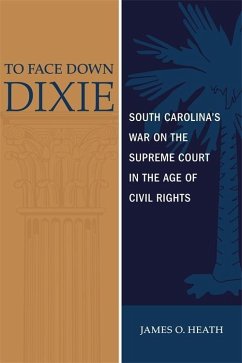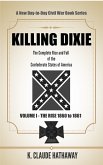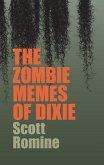In an era during which the United States Supreme Court handed down some of its most important decisions, including Brown v. Board of Education (1954), Baker v. Carr (1962), and Miranda v. Arizona (1966), three senators from South Carolina-Olin Johnston, Strom Thurmond, and Ernest "Fritz" Hollings-waged war on the court's progressive agenda by targeting the federal judicial nominations process. To Face Down Dixie explores these senators' role in some of the most contentious confirmation battles in recent history, including those of Thurgood Marshall, Abe Fortas, and Clement Haynsworth.
In scrutinizing Supreme Court nominees and attempting to restrict the power of the nine justices of the court, these senators defied not only the leadership of the Democratic Party but also the Senate traditions of hierarchy and seniority. Along with South Carolina's conservative, segregationist political establishment, which maintained ironclad control over the state's legislature, Johnston, Thurmond, and Hollings effectively drowned out the many moderate voices in South Carolina that remained critical of their obstructionism, thus advancing their own conservative credentials and boosting their chances of reelection.
To Face Down Dixie examines for the first time the central role that South Carolina played in turning Supreme Court nomination hearings into confrontational and political public events. James O. Heath argues that the state's war on the court concealed its antipathy to civil rights by using the confirmation process to challenge the court's function as the final arbiter of policy on questions relating to law and order, obscenity, communist subversion, and school prayer. Heath's study illustrates that while South Carolina's history of "massive resistance" is less prominent than that of other states, its politicians acted as persistent antagonists in the complex and dramatic debates in the U.S. Senate during the era of civil rights.
In scrutinizing Supreme Court nominees and attempting to restrict the power of the nine justices of the court, these senators defied not only the leadership of the Democratic Party but also the Senate traditions of hierarchy and seniority. Along with South Carolina's conservative, segregationist political establishment, which maintained ironclad control over the state's legislature, Johnston, Thurmond, and Hollings effectively drowned out the many moderate voices in South Carolina that remained critical of their obstructionism, thus advancing their own conservative credentials and boosting their chances of reelection.
To Face Down Dixie examines for the first time the central role that South Carolina played in turning Supreme Court nomination hearings into confrontational and political public events. James O. Heath argues that the state's war on the court concealed its antipathy to civil rights by using the confirmation process to challenge the court's function as the final arbiter of policy on questions relating to law and order, obscenity, communist subversion, and school prayer. Heath's study illustrates that while South Carolina's history of "massive resistance" is less prominent than that of other states, its politicians acted as persistent antagonists in the complex and dramatic debates in the U.S. Senate during the era of civil rights.
Dieser Download kann aus rechtlichen Gründen nur mit Rechnungsadresse in A, D ausgeliefert werden.









